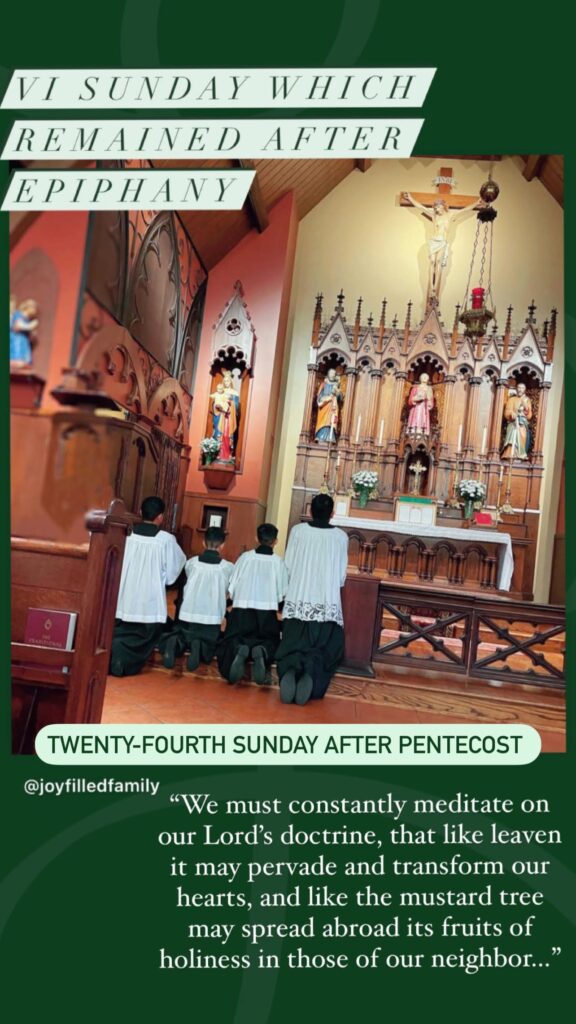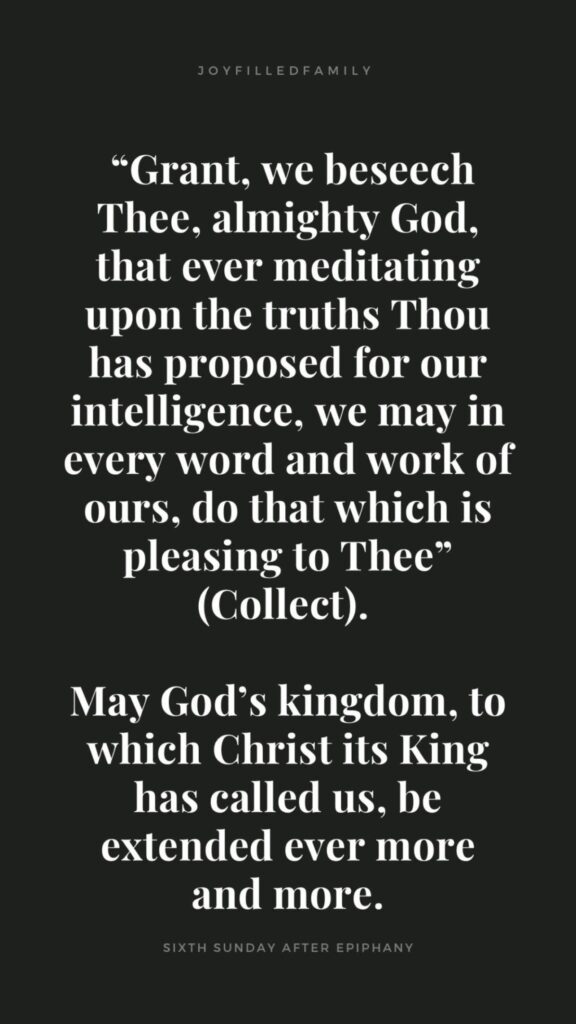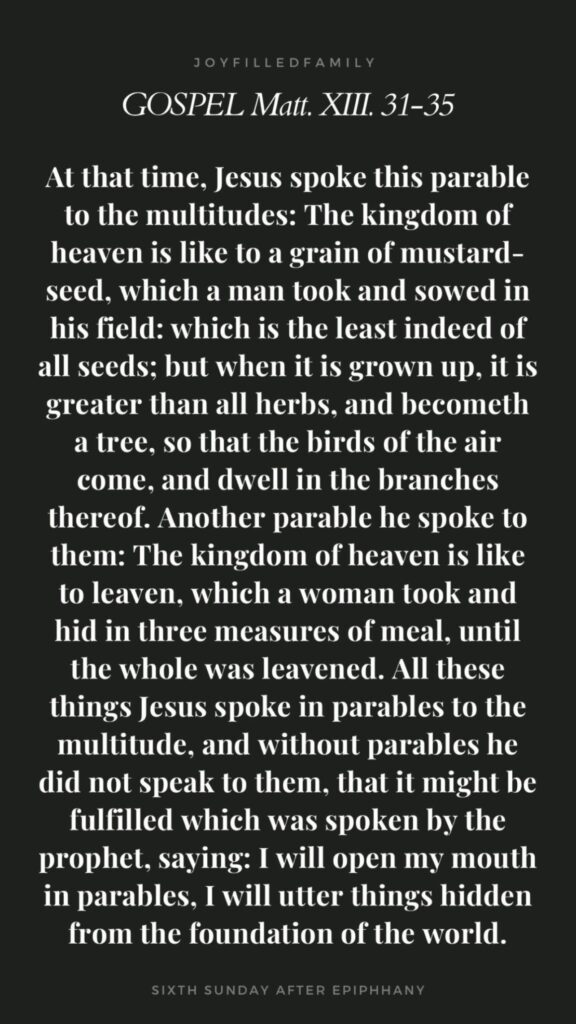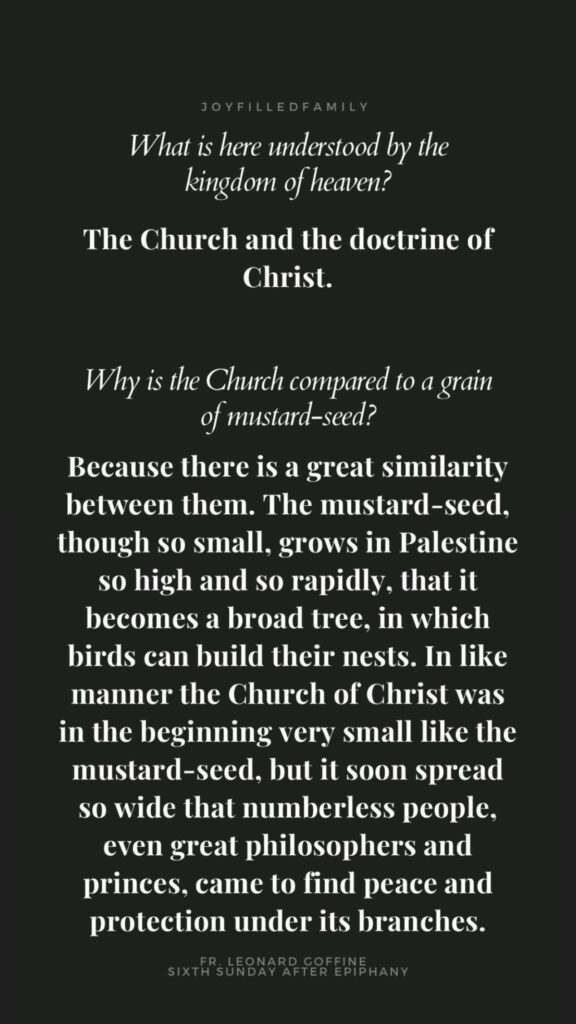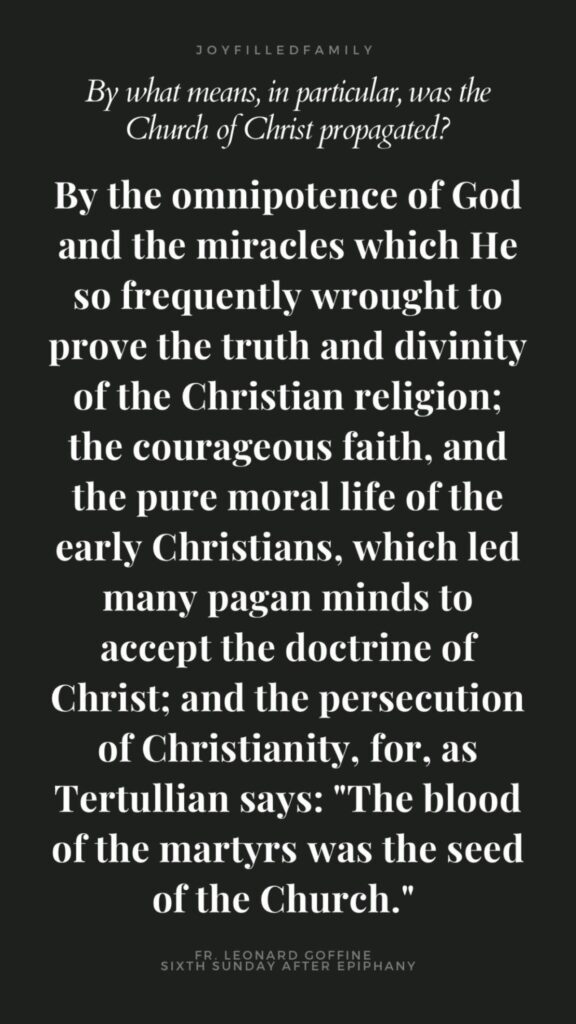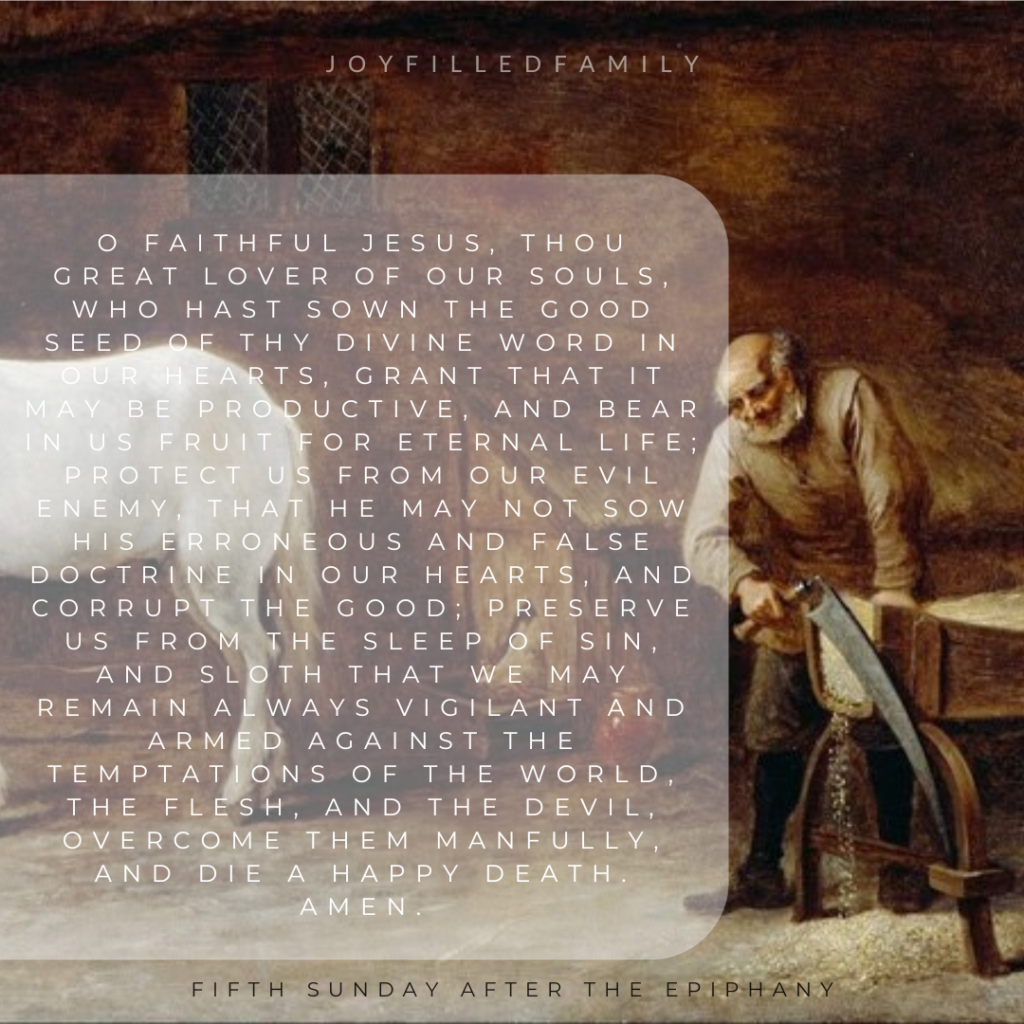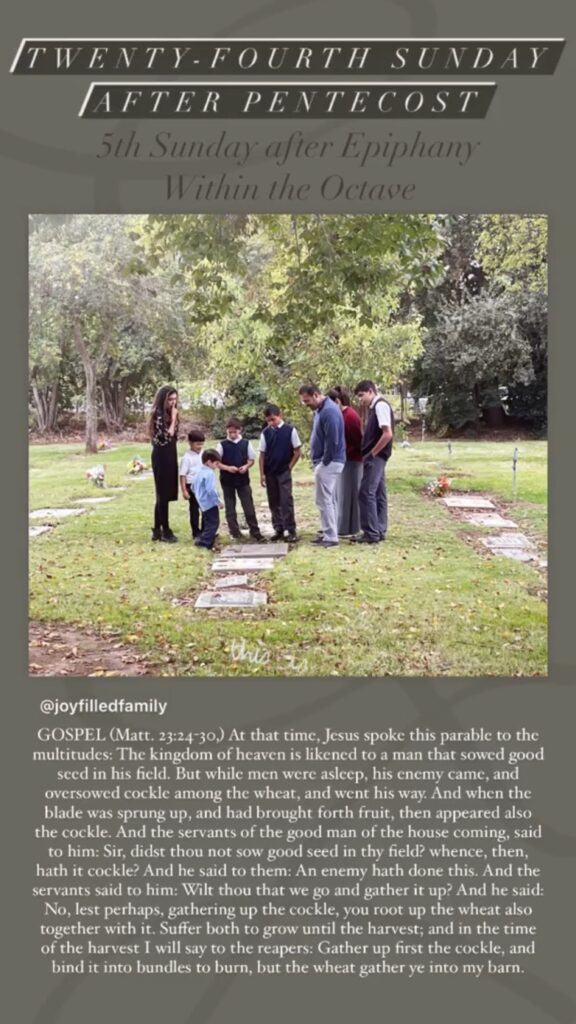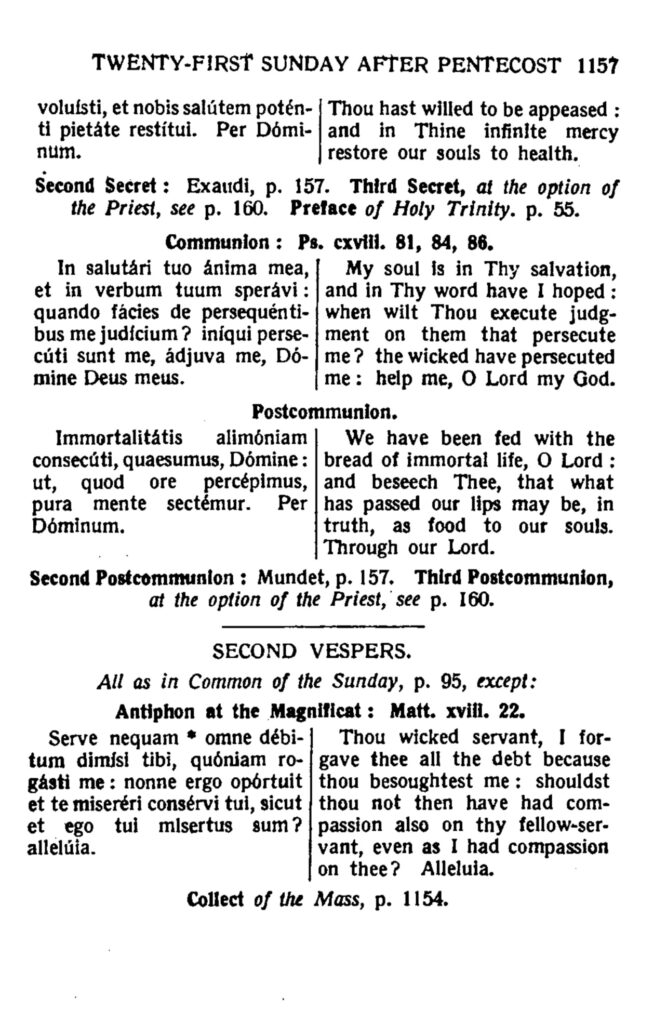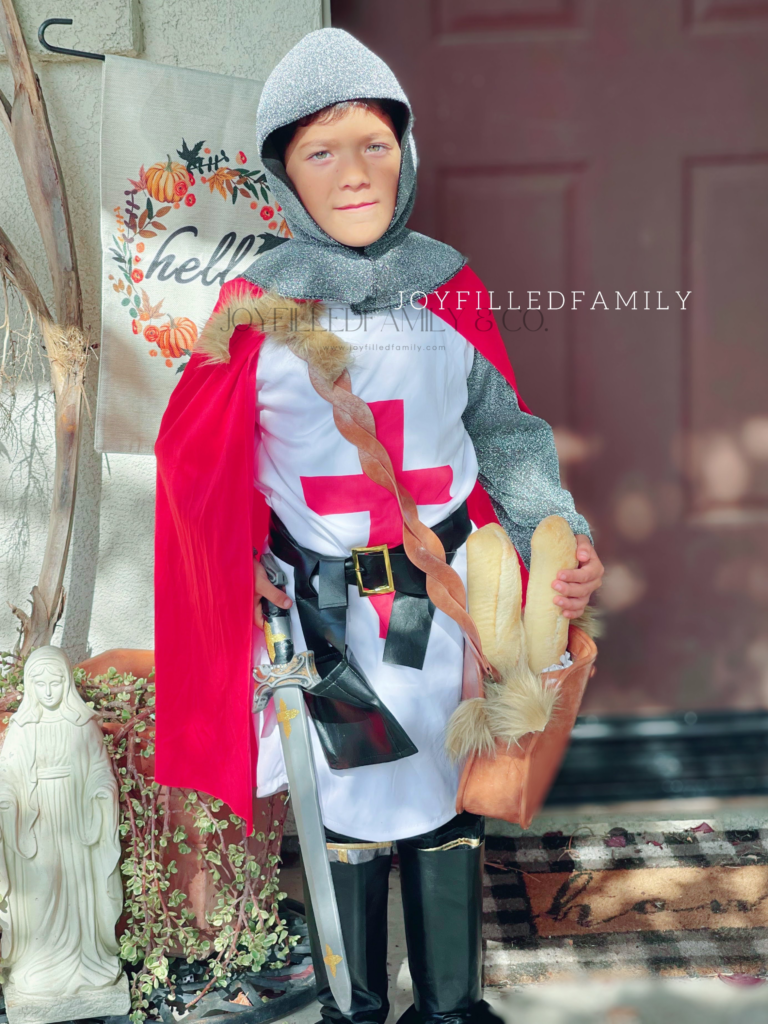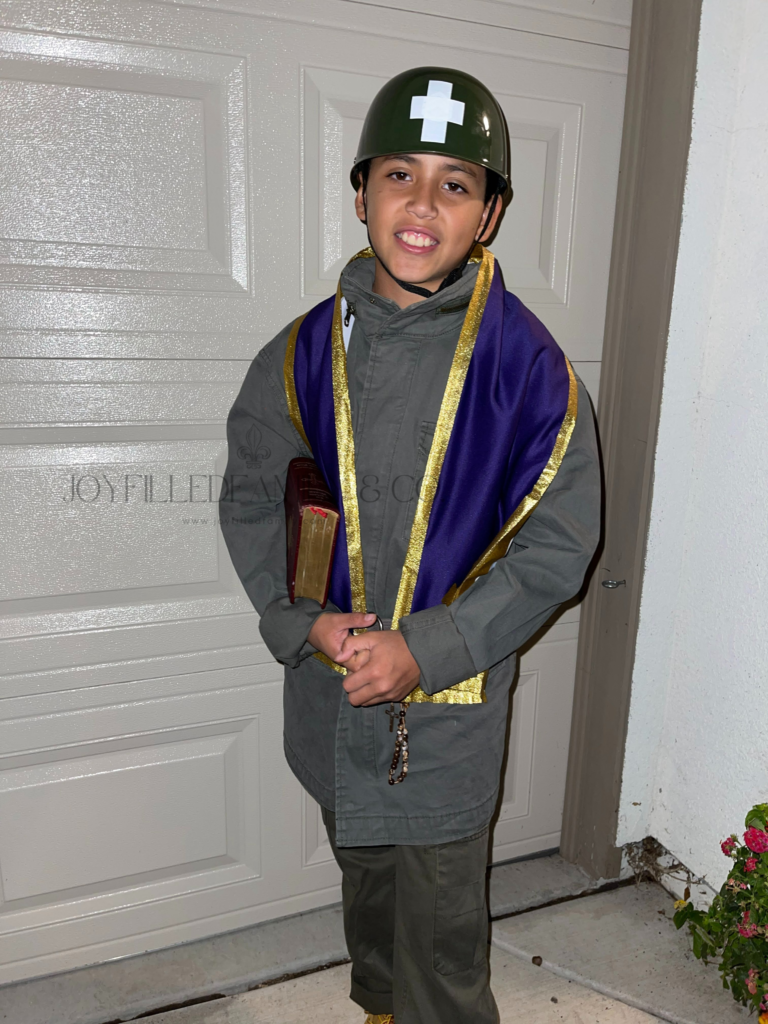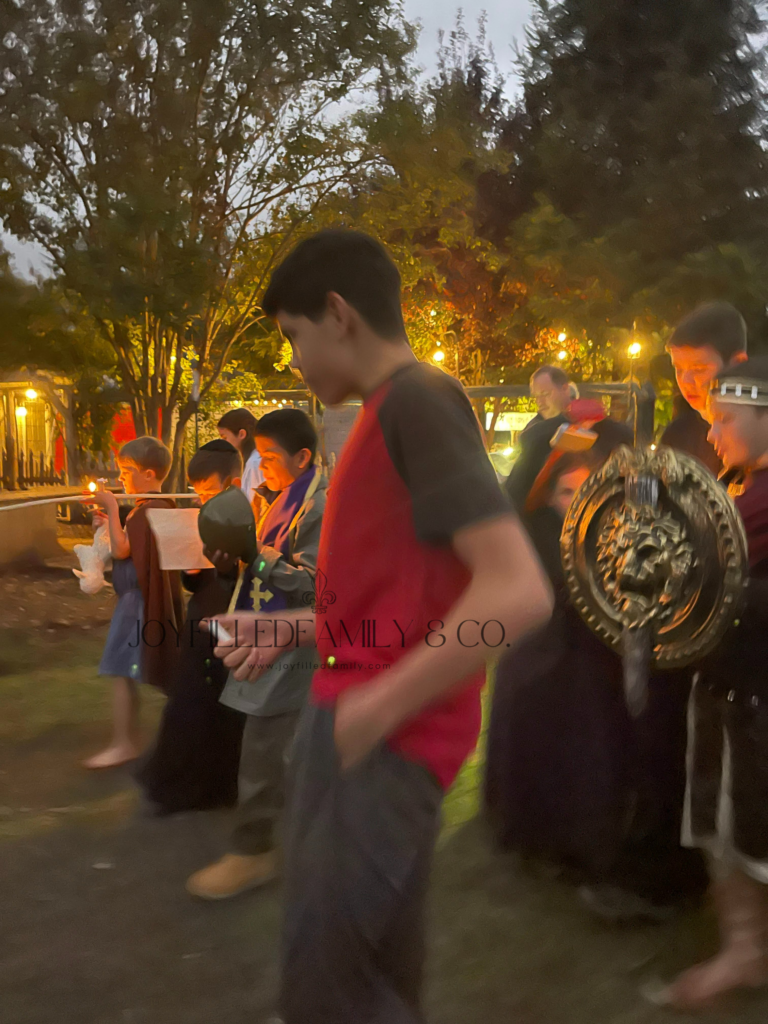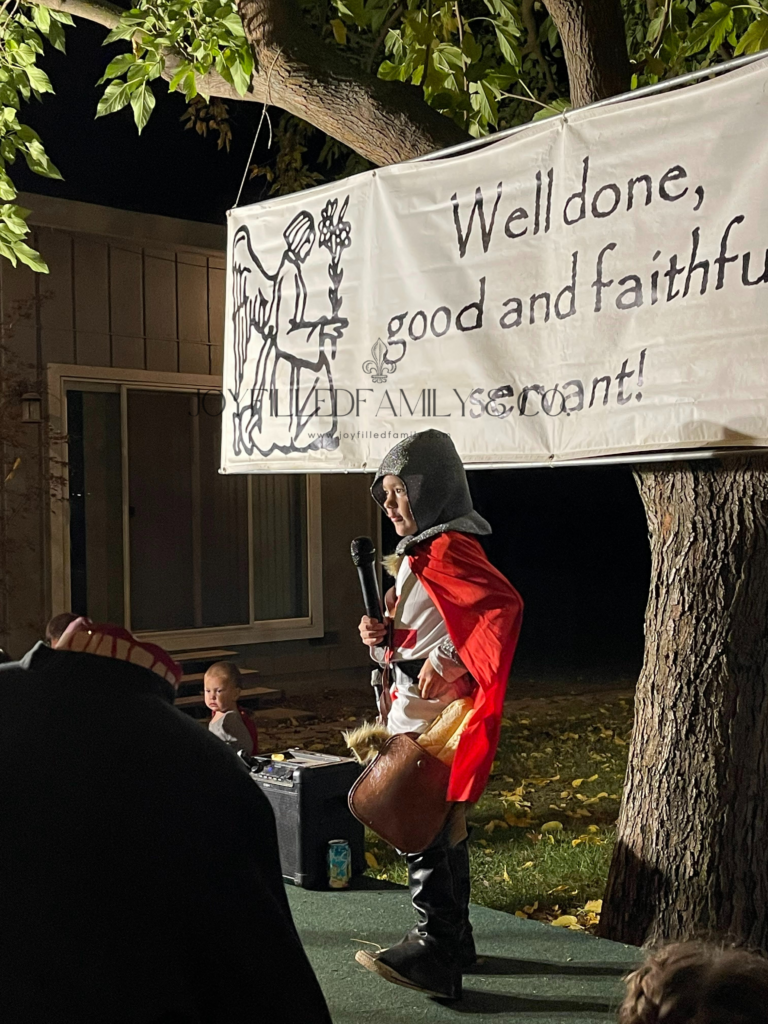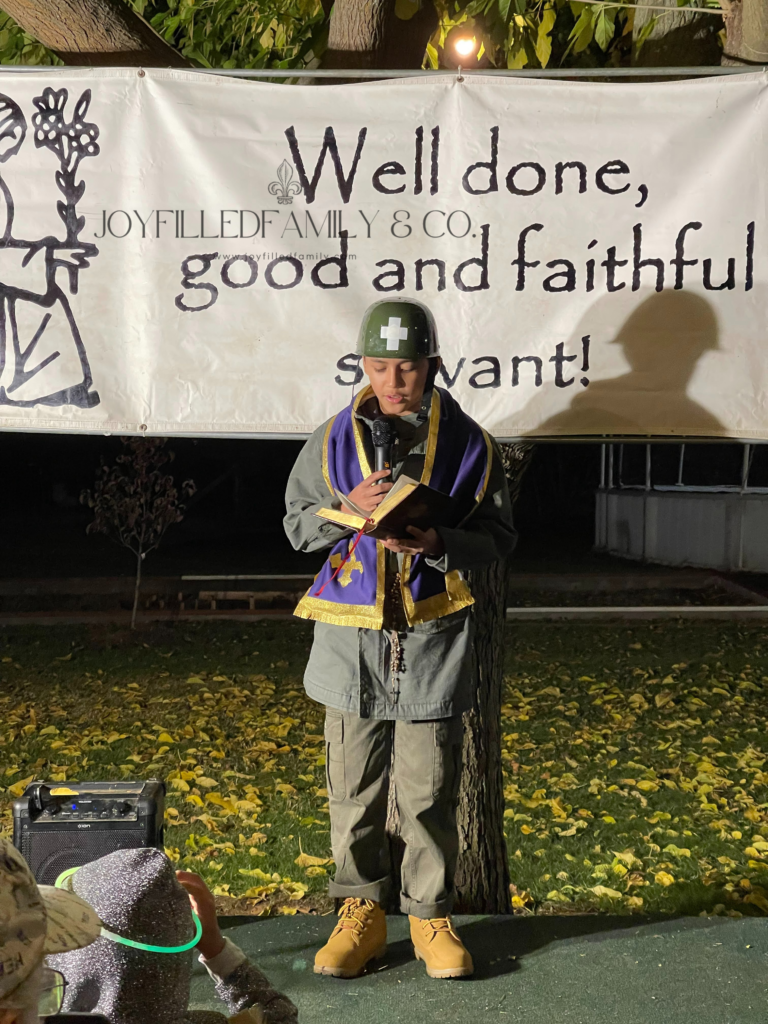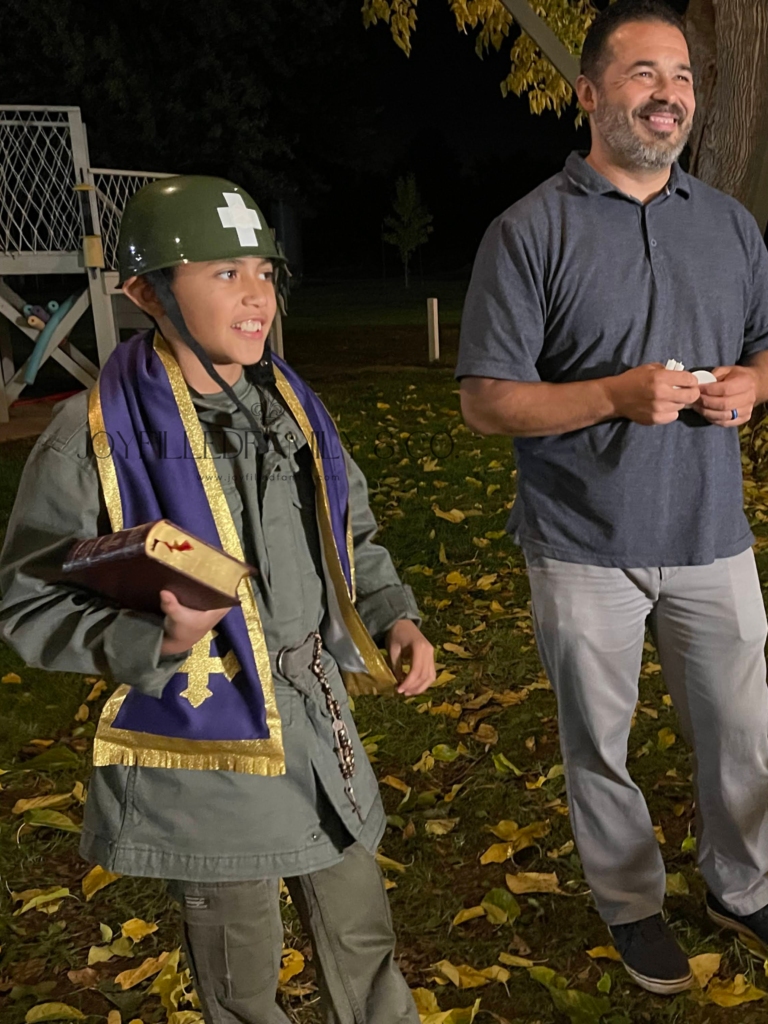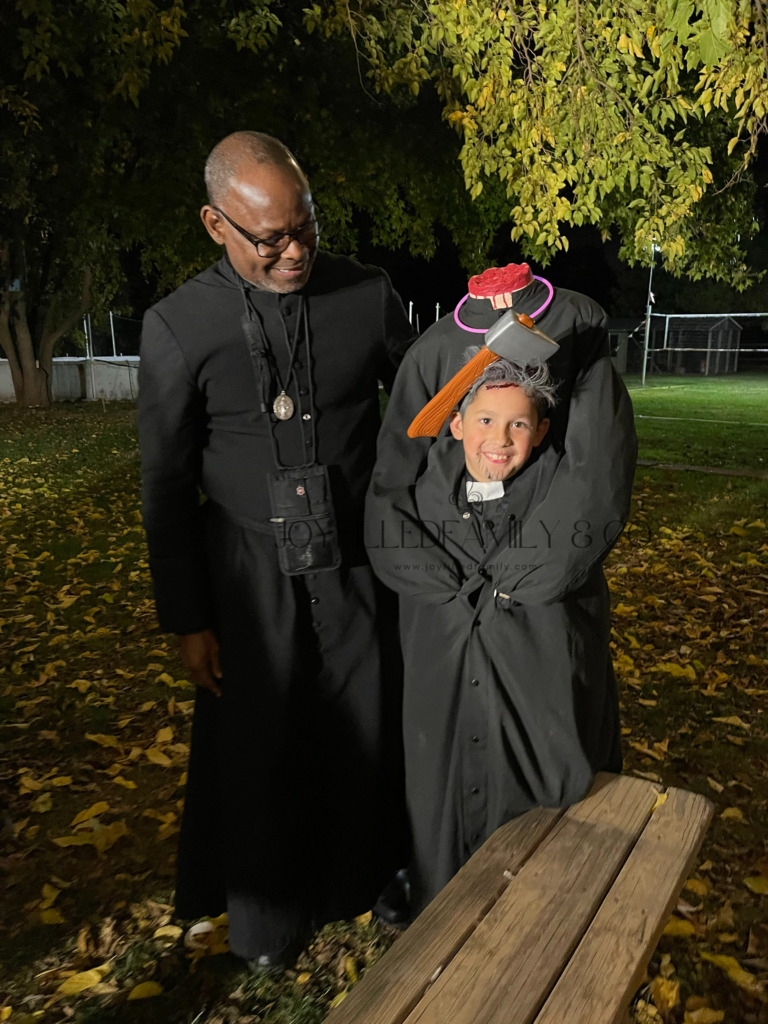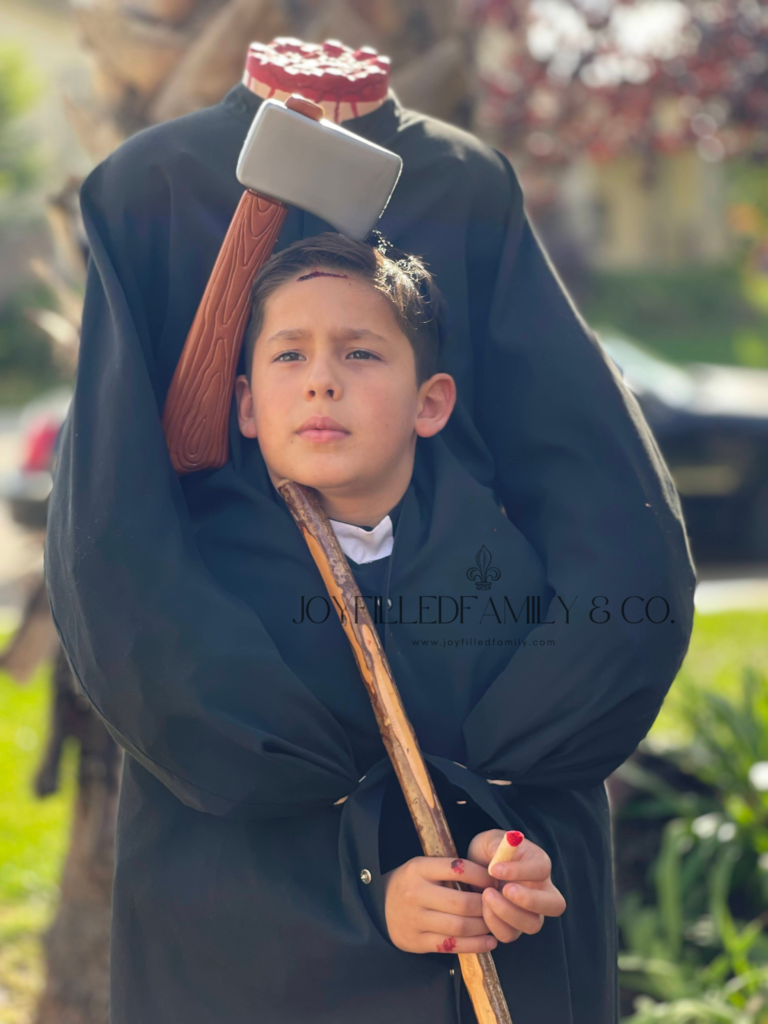To avoid dissensions we should be ever on our guard, more especially with those who drive us to argue with them, with those who vex and irritate us, and who say things likely to excite us to anger. When we find ourselves in company with quarrelsome, eccentric individuals, people who openly and unblushingly say the most shocking things, difficult to put up with, we should take refuge in silence, and the wisest plan is not to reply to people whose behavior is so preposterous. Those who insult us and treat us contumeliously are anxious for a spiteful and sarcastic reply: the silence we then affect disheartens them, and they cannot avoid showing their vexation; they do all they can to provoke us and to elicit a reply, but the best way to baffle them is to say nothing, refuse to argue with them, and to leave them to chew the cud of their hasty anger. This method of bringing down their pride disarms them, and shows them plainly that we slight and despise them. – Saint Ambrose, Offices
December 7 – Commemoration of SAINT AMBROSE
Ambrose was Roman governor of northern Italy and still a catechumen when a popular assembly chose him to be bishop of Milan in 374. After his baptism and episcopal consecration he fearlessly resisted the encroachment of civil authorities and defended the Faith against contemporary heretics backed by successive Emperors. Ambrose was a great preacher; many of his sermons and hymns have enriched our Liturgy. He is also responsible for the “Ambrosian Rite,” still used in Milan. The most illustrious of his converts was St. Augustine. According to an ancient tradition, when St. Augustine was baptized, he and St. Ambrose composed together the Te Deum, now the solemn hymn of thanksgiving of the Universal Church.
O God, may blessed Ambrose intercede for us in heaven as he once instructed Your faithful on earth and directed them in the way of eternal salvation. Through Our Lord . . .
Patronage:
- bee keepers
- bees
- bishops
- candle makers
- chandlers
- domestic animals
- French Commissariat
- geese
- honey cake bakers
- learning
- livestock
- police officers
- schoolchildren
- security personnel
- starlings
- students
- wax melters
- wax refiners
Pictorial Lives of the Saints – Saint Ambrose, Bishop
Ambrose was of a noble family, and was governor of Milan A.D. 374, when a bishop was to be chosen for that great see. As the Arian heretics were many and fierce, he was present to preserve order during the election. Though only a catechumen, it was the will of God that he should himself be chosen by acclamation; and, in spite of his utmost resistance, he was baptized and consecrated. He was unwearied in every duty of a pastor, full of sympathy and charity, gentle and condescending in things indifferent, but inflexible in matters of principle. He showed his fearless zeal in braving the anger of the Empress Justina, by resisting and foiling her impious attempt to give one of the churches of Milan to the Arians, and by rebuking and leading to penance the really great Emperor Theodosius, who in a moment of irritation had punished most cruelly a sedition of the inhabitants of Thessalonica. He was the friend and consoler of Saint Monica in all her sorrows, and in 387 he had the joy of admitting to the Church her son, Saint Augustine. Saint Ambrose died A.D. 397, full of years and of honors, and is revered by the Church of God as one of her greatest doctors.
Reflection – Whence came to Saint Ambrose his grandeur of mind, his clearness of insight, his intrepidity in maintaining the faith and discipline of the Church? Whence but from his contempt of the world, from his fearing God alone?
Pictorial Lives of the Saints, 1922.
Fr. Weninger’s Lives of the Saints – Saint Ambrose, Bishop of Milan
Saint Ambrose, one of the greatest doctors of the Church, a fearless defender of her rights, a terrible scourge to heresy, a most perfect example for all prelates, a miracle of Christian wisdom and eloquence, was the son of a Roman nobleman, who presided in Gaul as imperial governor. One day, while Ambrose was yet in his cradle, a swarm of bees alighted on his mouth without in the least harming the sleeping infant. It is believed that God by this announced the future sweet and yet powerful eloquence of Saint Ambrose. After his father’s death, the Saint went to Rome with his mother, brother and sister. There he, one day, saw the people kiss the hand of a bishop, and, on his return home, he offered his hands to some children to kiss, saying: “Kiss my hands; for, when I grow up I shall be a bishop.” These words, spoken in childish jest, were prophetic. Ambrose was endowed by the Almighty with unusual facility for acquiring knowledge. Untiring in his studies, he became so excellent an orator, and so celebrated a jurist, that he was made governor of Aemilia and Liguria when he was hardly thirty-two years old. Probus, the imperial chancellor, said to him, before his departure: “Go, and administer your functions, not as a judge, but as a bishop.” He meant by this that Ambrose should not govern by severity but with love and mildness; heaven’s signification of these words, however, was different. When Ambrose, invested with this high dignity, arrived at Milan, he so completely gained all hearts by his wise and mild government, that the people obeyed him implicitly, and loved him most devotedly. Hardly had he been two years at Milan when Auxentius, the Arian bishop, whom the Emperor Constantius had placed in the episcopal chair, died. The Catholics desired a Catholic, the Arians, an Arian bishop, and the conflict of contending parties produced a dangerous excitement. Ambrose, as imperial officer, thought it his duty to prevent greater mischief, and hence, going into the church, he endeavored by his eloquence to calm the people. Hardly had he ended his speech, when a child cried aloud: “Ambrose, bishop I” This came like a call from heaven, and all the people, together with the clergy, rejoiced and repeated three times: “Ambrose, our bishop!” This sudden accordance of so many different minds could only be regarded as providential, the more so, as Ambrose was still a layman, and not even baptized; as, at that period, some delayed their baptism until they had become quite old. Ambrose, inexpressibly amazed at this unexpected turn of affairs, employed all his eloquence to change the thoughts of the people; he mingled his tears with his words, and when he found that all was of no avail, he secretly fled. Being soon found and brought back, he twice attempted to escape again, but was each time found. Valentinian, the emperor, was greatly pleased with the choice, and when Ambrose recognized that it was the will of the Almighty that he should fill the vacant See, he made no further resistance. After having prepared himself, he was baptized, ordained priest, and consecrated bishop; and then entered upon his high ecclesiastical functions with the most holy intentions.
He who would endeavor to relate all that the bishop, so miraculously elected, performed for the welfare of the Church, and the holy life he led, would have to write many volumes. Let it suffice to say, that he exercised himself in all kinds of good works. Early in the morning he passed a long time in prayer. He often exhorted others to do the same, saying: “Do you not know, O man, that you owe your first thoughts, the first words of your mouth to the Lord your God? Daily must you make Him this offering.” His severity in fasting was extremely great, and when advised to moderate it, for the reason that it would occasion his early death, he said: “Many have found death from too much eating, no one from fasting.” Unbounded was his charity to the poor, and his episcopal revenues were almost all employed to assist the needy. Three points he had determined to observe most strictly: to say Mass every day; to preach to the people every Sunday, and to leave nothing undone to spread the true faith, abolish heresy, and correct the morals of the people. In his sermons, he spoke so frequently of the merit and worth of virginal purity, that the number of those can scarcely be counted who made the vow of chastity, and received from his hands the consecrated veil. Still greater was the number of hardened sinners and heretics whom he converted by his sermons. Among the latter was Augustine, who afterwards became so shining a light in the Church. Saint Ambrose baptized him with his own hand, to his great consolation. The knowledge of the divine mysteries which Ambrose manifested in his preaching and writings, was imparted to him by heaven; hence he is represented with a dove at his ear, as a symbol of the Holy Ghost, who inspired him when he spoke or wrote. An Arian heretic testified that he had seen an angel speaking to Saint Ambrose in the pulpit; and this miracle converted the heretic. The fortitude with which he protected the rights and privileges of the Church against the heretics and against crowned heads, was almost more than human. The Arians persecuted him in every possible manner, especially after the death of the pious emperor Gratian, when the wicked empress Justina, wife of Valentinian the younger, ruled the land. The holy man, however, always resisted bravely. One day, the emperor Valentinian, counselled by the empress Justina, sent an order to him to give up a church to the Arians at Milan. The bearer of this order menaced the bishop with death in case he refused; but Ambrose paid no attention to the menace, refused to obey the order, and reprimanded the emperor. Among other things he said to him: “Do not imagine that you possess an imperial right over that which belongs to God. To the emperor belong the palaces, but the churches to the priests. You have power over the walls of the churches, but not over the sanctuary.” To this subject belongs, also, what he wrote at another time to the emperor Theodosius: “The purple makes one a king or an emperor, but not a priest.” Justina raged with anger, and hired a man to carry the bishop off secretly out of the city, that she might deal with the Catholics according to her own pleasure. The hired ruffian waited in the neighborhood of the church with a carriage, into which he was forcibly to place the bishop; but the Saint was accompanied by so many people, that the plan of the empress could not be executed. God even so ruled it that, a year later, this godless man was taken out of the city in the same vehicle, on account of his crimes. At another time, the Arians sent an assassin into the episcopal palace to murder the Saint; but when the wretch raised the sword for the deadly stroke, his arm suddenly stiffened in such a manner that he was unable to move it. He then repented of his evil design, knelt at the feet of the bishop, and begged pardon. Ambrose not only forgave him, but also restored the use of his arm, and admonished him to reform his life. At another time, they bribed a magician to strangle the Saint in his own room by his witchcraft. Although this magician conjured several demons of hell, and commanded them to strangle the Saint, they could not harm him, nor even go near his dwelling, as it was surrounded by angelic hosts. The bishop, thus miraculously protected, was not to be frightened by the persecutions of the Arians, but continued in his zeal to work against them, so that many of them became converted. He strove with equal fortitude against the heresiarch Jovinian and his followers, whom he banished entirely out of his diocese.
The Saint never manifested greater strength of mind than at the time when the pious emperor, Theodosius, at the instigation of some wicked courtiers, had cruelly slaughtered several thousand inhabitants of Thessalonica, in reprisal for the assassination of one of his generals. When, some time afterwards, the emperor wished to enter the Church, the bishop, clad in his episcopal robes, went to meet him, and commanded him to stop and not enter the sacred building until he had done penance. The emperor, awestruck at this proceeding, said: “Did not King David sin?” The holy bishop replied: “You have followed King David in his sin; follow him also in doing penance;” – and permitted him not to enter the church until he had done penance during eight months. Much that the holy man did for the honor of God and the welfare of the true Church and of his flock, we must omit, and say a few words of his happy departure from this life. Saint Ambrose became enfeebled by the unceasing labor imposed upon him, and also by his rigorous fasting and other penances, and his soul longed to see God, the end and aim of his being. The day of his death was revealed to him, and when he was seized by his last illness, he was begged to pray that his life might be prolonged for the benefit of the Church and the salvation of souls; but he replied: “I have lived in such a manner among you that I need not be ashamed; and I fear not to die, because we have a merciful Lord.” Saint Honoratus, bishop of Vercelli, was at that time in the palace of the bishop. During the night he was suddenly awakened by a voice saying to him: “Honoratus, rise quickly; the Saint is dying.” Honoratus repaired hastily to the sick bishop, administered once more the holy sacraments to him, after which the Saint, his arms folded over his breast, gave his soul to our Lord, in the year 397 of the Christian era, at the dawn of Easter Sunday. Oh! how’ happy a dying day! God, who had glorified His faithful servant during life by miracles and especial graces, ceased not to increase his glory after his death. The many eloquent works which still exist of this great Father of the Church, are witnesses of his perfect holiness and heavenly wisdom.
Practical Considerations
• Remember the words of Saint Ambrose: “In too much eating many have found their death; but none in fasting.” Heed this sentence well; especially if you belong to those poor and deluded beings who imagine that the fasts, ordained by the Church, are injurious to health. Even the word of God assures us, that many have shortened their lives by intemperance in eating and drinking, and the experience of almost every day is another overwhelming evidence of this fact. But where can you point out to me any one who shortened his life, by observing the fasts ordained by the Church? The word of God assures us that those who are temperate in eating and drinking, prolong their lives. Whom do you believe, the word of God, or the evil Spirit, who, through the mouth of the free-thinkers, the heretics, or of those wicked persons, whose life makes them despicable, says, that fasting and abstaining is hurtful to man, that it is the cause of many infirmities and that it shortens life. The true Church, by whose mouth God speaks, prays: “O Lord, who, by holy fasting and abstinence, dost help both soul and body:” which means: curest soul and body as by a remedy. I believe in this prayer, and with me all those who are true Catholic Christians.
• “I fear not to die, because we have a merciful Lord,” says Saint Ambrose. So it is; we have a merciful, a most kind Lord. All who endeavor to serve Him faithfully during their life, can and may comfort themselves with the thought of the divine mercy in their last hour. Satan sometimes tries to frighten and drive to despondency even pious souls, but recollecting that they have served the Lord rightly, and confessed their sins, they ought not to listen to the Evil One; but, contemplating the infinite mercy of God, comfort themselves and say: “We have a merciful Lord.” In Him will I trust; He will not forsake me. But those who during their life, have abused the divine goodness in order to be more wicked; who sinned because God, so infinitely good and merciful, would forgive them; these, I say, have reason to fear the temptations of Satan in their last hour; for, he generally comes then to throw us into gloom and despair by representing the severity , of the divine Justice. Take care not to be of the number of these unhappy people. Serve God faithfully during your life; do not offend Him: and if you have done wrong, do penance and seek to regain the grace of the Almighty. In this manner, you will be able to comfort yourself on your death-bed with the thought of His goodness, and say: “I have a merciful God; in Him will I trust.” Exercise yourself today in this hope, and say with King David: “The Lord is my light and my salvation, whom shall I fear? The Lord is the protector of my life, of whom shall I be afraid? If armies in camp should stand together against me, my heart shall not fear. Turn not away thy face from me. Be you my helper, forsake me not, do not you despise me, O God, my Saviour!” (Psalm 26) And again: “I cried to thee, O Lord, I said: you art my hope, my portion in the land of the living.” (Psalm 141)
Father Francis Xavier Weninger, DD, SJ. “Saint Ambrose, Bishop of Milan”. Lives of the Saints, 1876.
The Liturgical Year: Saint Ambrose, Bishop and Doctor of the Church
7 December
This illustrious Pontiff was deservedly placed in the Calendar of the Church side by side with the glorious Bishop of Myra. Nicholas confessed, at Nicaea, the divinity of the Redeemer; Ambrose, in his city of Milan, was the object of the hatred of the Arians, and, by his invincible courage, triumphed over the enemies of Christ. Let Ambrose, then, unite his voice, as Doctor of the Church, with that of Saint Peter Chrysologus, and preach to the world the glories and the humiliations of the Messias. But, as Doctor of the Church, he has a special claim to our veneration: it is, that among the bright luminaries of the Latin Church, four great Masters head the list of sacred Interpreters of the Faith; Gregory, Augustine, Jerome; and then our glorious Ambrose, Bishop of Milan, makes up the mystic number.
Ambrose owes his noble position in the Calendar to the ancient custom of the Church, whereby, in the early ages, no Saint’s feast was allowed to be kept in Lent. The day of his departure from this world and of his entrance into heaven was the fourth of April, which, more frequently than not, comes during Lent: so that it was requisite that the memory of his sacred death should be solemnised on some other day, and the seventh of December naturally presented itself for such a feast, inasmuch as it was the anniversary day of Ambrose’s being consecrated Bishop.
But, independently of these considerations, the road which leads us to Bethlehem could be perfumed by nothing so fragrant as by this feast of Saint Ambrose. Does not the thought of this saintly and amiable Bishop impress us with the image of dignity and sweetness combined? of the strength of the lion united with the gentleness of the dove? Time removes the deepest human impressions; but the memory of Ambrose is as vivid and dear in men’s minds as though he was still among us. Who can ever forget the young, yet staid and learned governor of Liguria and Emilia, who comes to Milan as a simple catechumen, and finds himself forced, by the acclamations of the people, to ascend the episcopal throne of this great city? And how indelibly impressed upon us are certain touching incidents of his early life! For instance, that beautiful presage of his irresistible eloquence, the swarm of bees coming round him as he was sleeping one day in his father’s garden, and entering into his mouth, as though they would tell us how sweet that babe’s words would be? and the prophetic gravity with which Ambrose, when quite a boy, would hold out his hand to his mother and sister, bidding them kiss it, for that one day it would be the hand of a Bishop!
But what hard work awaited the neophyte of Milan, who was no sooner regenerated in the waters of baptism, than he was consecrated Priest and Bishop! He had to apply himself, there and then, to a close study of the sacred Scriptures, that so he might prepare himself to become the defender of the Church, which was attacked, in the fundamental dogma of the Incarnation, by the false science of the Arians. In a short time he attained such proficiency in the sacred sciences, as to become, like the Prophet, a wall of brass, which checked the further progress of Arianism: not only so, but the works written by Ambrose possessed that plenitude and surety of doctrine, as to be numbered by the Church among the most faithful and authoritative interpretations of her teaching.
But Ambrose had other and fiercer contests than those of religious controversy to encounter in his very life was more than once threatened by the heretics whom he had silenced. What a sublime spectacle that of a Bishop blockaded in his church by the troops of the Empress Justina, and defended within by his people, day and night! Pastor and flock, both are admirable. How had Ambrose merited such fidelity and confidence on the part of this people? By a whole life spent for the welfare of his city and his country. He had never ceased to preach Jesus to all men; and now, the people see their Bishop become, by his zeal, his devotedness, and his selfsacrificing conduct, a living image of Jesus.
In the midst of these dangers which threatened his person, his great soul was calm and seemingly unconscious of the fury of his enemies. It was on that very occasion that he instituted, at Milan, the choral singing of the Psalms. Up to that time, the holy Canticles had been given from the Ambo by the single voice of a Lector; but Ambrose, shut up in his Basilica with his people, takes the opportunity, and forms two choirs, bidding them respond to each other the verses of the Psalms. The people forgot their trouble in the delight of this heavenly music; nay, the very howling of the tempest, and the fierceness of the siege they were sustaining, added enthusiasm to this first exercise of their new privilege. Such was the chivalrous origin of Alternate Psalmody in the Western Church. Rome adopted the practice, which Ambrose was the first to introduce, and which will continue to be observed to the end of time. During these hours of struggle with his enemies, the glorious Bishop has another gift wherewith to enrich the faithful people who are defending him at the risk of their own lives.
Ambrose is a poet, and he has frequently sung, in verses full of sweetness and sublimity, the greatness of the God of the Christians, and the mysteries of man’s salvation. He now gives to his devoted people these hymns, which he had only composed for his own private devotion. The Basilicas of Milan soon echoed these accents of the sublime soul which first uttered them. Later on, the whole Latin Church adopted them; and in honour of the holy Bishop who had thus opened one of the richest sources of the sacred Liturgy, a Hymn was, for a long time, called after his name, an Ambrosian. The Divine Office thus received a new mode of celebrating the divine praise, and the Church, the Spouse of Christ, possessed one means more of giving expression to the sentiments which animate her.
Thus our Hymns, and the alternate singing of the Psalms, are trophies of Ambrose’s victory. He had been raised up by God not for his own age only, but also for those which were to follow. Hence, the Holy Ghost infused into him the knowledge of Christian jurisprudence, that he might be the defender of the rights of the Church at a period when paganism still lived, though defeated; and imperialism, or cesarism, had still the instinct, though not the uncontrolled power, to exercise its tyranny. Ambrose’s law was the Gospel, and he would acknowledge no law which was in opposition to that. He could not understand such imperial policy as that of ordering a Basilica to be given up to the Arians, for quietness’ sake! He would defend the inheritance of the Church; and in that defence, would shed the last drop of his blood. Certain courtiers dared to accuse him of tyranny: “No,” answered the Saint, “Bishops are not tyrants, but have often to suffer from tyranny.” The eunuch Calligonus, high chamberlain of the Emperor Valentinian the Second had said to Ambrose: “What! you dare, in my presence, to care so little for Valentinian! I will cut off your head.” “I would it might be so,” answered Ambrose, “I should then die as a Bishop, and you would do what eunuchs do.”
This noble courage in the defence of the rights of the Church, showed itself even more clearly on another occasion. The Roman Senate, or rather that portion of the Senate, which, though a minority, was still Pagan, was instigated by Symmachus, the Prefect of Rome, to ask the Emperor for the re-erection of the altar of Victory in the Capitol, under the pretext of averting the misfortunes which threatened the empire. Ambrose, who had said to these politicians, “I hate the Religion of the Neros,” vehemently opposed this last effort of idolatry. He presented most eloquent petitions toValentinian, in which he protested against an attempt, whose object was to bring a Christian Prince to recognise that false doctrines have rights, and which would, if permitted to be tried, rob Him, who is the one only Master of nations, of the victories which he had won. Valentinian yielded to these earnest remonstrances, which taught him “that a Christian Emperor can only honour one Altar, the Altar of Christ.” And when the Senators had to receive their answer, the prince told them that Rome was his mother, and he loved her; but that God was his Saviour, and he would obey Him.
If the Empire of Rome had not been irrevocably condemned by God to destruction, the influence which Saint Ambrose had over such well-intentioned princes as Valentinian would probably have saved it. The Saint’s maxim to the Rulers of the world was this, though it was not to be realised in any of them until new kingdoms should spring up out of the ruins of the Roman Empire, and those new kingdoms and peoples organised by the Christian Church: but Saint Ambrose could have no other, and he therefore taught the Emperors of those times, that “an Emperor’s grandest title is to be a Son of the Church. An Emperor is in the Church, he is not over her.”
It is beautiful to see the affectionate solicitude of Saint Ambrose for the young Emperor Gratian, at whose death he shed floods of tears. How tenderly, too, did he not love Theodosius, that model Christian prince, for whose sake God retarded the fall of the Empire, by the uninterrupted victory over all its enemies! On one occasion, indeed, this Son of the Church showed in himself the Pagan Caesar; but his holy father Ambrose, by a severity, which was inflexible because his affection for the culprit was great, brought him back to his duty and his God. “I loved,” says the holy Bishop, in the funeral oration which he preached over Theodosius, “I loved this Prince, who preferred correction to flattery. He stripped himself of his royal robes, and publicly wept in the Church for the sin he had committed, and into which he had been led by evil counsel. In sighs and tears he sought to be forgiven. He, an Emperor, did what common men would be ashamed to do, he did public penance; and for the rest of his life, he passed not a day without bewail- ing his sin.”
But we should have a very false idea of Saint Ambrose, if we thought that he only turned his attention to affairs of importance like these, which brought him before the notice of the world. No pastor could be more solicitous than he about the slightest details which affected the interests of his flock. We have his life written by his deacon, Paulinus, who knew secrets which intimacy alone can know, and these fortunately he has revealed to us. Among other things, he tells us that when Ambrose heard confessions, he shed so many tears that the sinner was forced to weep: “You would have thought,” says Paulinus, “that they were his own sins that he was listening to.” We all know the tender paternal interest he felt for Augustine, when he was a slave to error and his passions; and if we would have a faithful portrait of Ambrose, we must read in the Confessions of the Bishop of Hippo the fine passage where he expresses his admiration and gratitude for his spiritual father. Ambrose had told Monica, that her son Augustine, who gave her so much anxiety, would be converted. That happy day at last came; it was Ambrose’s hand which immersed into the cleansing waters of Baptism him who was to be the prince of the Doctors of the Church.
A heart thus loyal in its friendship, could not but be affectionate to those who were related by ties of blood. He tenderly loved his brother Satyrus, as we may see from the two funeral orations which he has left us upon this brother, wherein he speaks his praises with all the warmth of enthusiastic admiration. He had a sister, too, named Marcellina, who was equally dear to her saintly brother. From her earliest years, she had spurned the world and its pomps, and the position which she might expect to enjoy in it as being a Patrician’s daughter. She had received the veil of virginity from the hands of Pope Liberius, but lived in her father’s house at Rome. Her brother Ambrose was separated from her, but he seemed to love her the more for that; and he communicated with her in her holy retirement by frequent letters, several of which are still extant. She deserved all the esteem which Ambrose had for her; she had a great love for the Church of God, and she was heart and soul in all the great undertakings of her brother the Bishop. The very heading of these letters shows the affection of the Saint: “The Brother to the Sister;” or, “To my sister Marcellina, dearer to me than mine own eyes and life.” Then follows the letter, in a style of nerve and animation, well suited to the soul- stirring communications he had to make to her about his struggles. One of them was written in the midst of the storm, when the courageous Pontiff was besieged in his Basilica by Justina’s soldiers. His discourses to the people of Milan, his consolations and his trials, the heroic sentiments of his great soul, all is told in these despatches to his sister, and where every line shows how strong and holy was the attachment between Ambrose and Marcellina. The great Basilica of Milan still contains the tomb of the brother and sister: and over them both is daily offered the divine sacrifice.
Such was Ambrose, of whom Theodosius was one day heard to say: “There is but one Bishop in the world.” Let us glorify the Holy Spirit, who has vouchsafed to produce this sublime model in the Church, and let us beg of the holy Pontiff to obtain for us, by his prayers, a share in that lively faith and ardent love which he himself had, and which he evinces in those delicious and eloquent writings, which he has left us on the mystery of the Incarnation. During these days, which are preparing us for the Birth of our Incarnate Lord, Ambrose is one of our most powerful patrons.
His love towards the Blessed Mother of God teaches us what admiration and devotion we ought to have for Mary. Saint Ephrem and Saint Ambrose are the two Fathers of the fourth century, who are the most explicit upon the glories of the office and the person of the Mother of Jesus. To confine ourselves to Saint Ambrose, he has completely mastered this mystery, which he understood, and appreciated, and defined in his writings. Mary’s exemption from every stain of sin; Mary’s uniting herself, at the foot of the Cross, with her Divine Son for the salvation of the world; Jesus’ appearing, after his resurrection, to Mary first of all; on these and so many other points Saint Ambrose has spoken so clearly as to deserve to be considered as one of the most prominent witnesses of the primitive traditions respecting the privileges and dignity of the holy Mother of God.
This his devotion to Mary explains Saint Ambrose’s enthusiastic admiration for the holy state of Christian Virginity, of which he might justly be called the Doctor. He surpasses all the Fathers in the beautiful and eloquent manner in which he speaks of the dignity and happiness of Virginity. Four of his writings are devoted to the praises of this sublime state. The Pagans would fain have an imitation of it, by instituting seven Vestal Virgins, whom they loaded with honours and riches, and to whom they in due time restored liberty. Saint Ambrose shows how contemptible these were, compared with the innumerable Virgins of the Christian Church, who filled the whole world with the fragrance of their humility, constancy, and disinterestedness. But on this magnificent subject, his words were even more telling than his writings; and we learn from his contemporaries, that when he went to preach in any town, mothers would not allow their daughters to be present at his sermon, lest this irresistible panegyrist of the eternal nuptials with the Lamb, should convince them that that was the better part, and persuade them to make it the object of their desires.
But our partiality and devotion to the great Saint of Milan has made us exceed our usual limits: it is time to read the account of his virtues given lis by the Church.
Ambrose, Bishop of Milan, was the son of a Roman citizen, whose name was also Ambrose, and who held the office of Prefect of Cisalpine Gaul. It is related that when the saint was an infant, a swarm of bees rested on his lips; it was a presage of his future extraordinary eloquence. He received a liberal education at Rome, and not long after was appointed by the Prefect Probus to be Governor of Liguria and Emilia, whence, later on, he was sent, by order of the same Probus, to Milan, with power of Judge; for the people of that city were quarrelling among themselves about the successor of the Arian Bishop, Auxentius, who had died. Wherefore, Ambrose, having entered the Church that he might fulfill the duty that had been imposed on him, and quell the disturbance that had arisen, delivered an eloquent discourse on the advantages of peace and tranquillity in a State. Scarcely had he finished speaking than a boy exclaimed: Ambrose, Bishop! The whole multitude shouted: Ambrose, Bishop!
On his refusing to accede to their entreaties, the earnest request of the people was presented to the Emperor Valentinian, who was gratified that they whom he selected as Judges were thus sought after to be made Priests. It was also pleasing to the Prefect Probus, who, as though he foresaw the event, said to Ambrose on his setting out: Go, act not as Judge, but as Bishop. The desire of the people being thus seconded by the will of the Emperor, Ambrose was baptised (for he was only a catechumen), and was admitted to sacred Orders, ascending by all the degrees of Orders as prescribed by the Church; and on the eighth day, which was the seventh of the Ides of December (December 7th), he received the burden of the Episcopacy. Being made Bishop, he most strenuously defended the Catholic faith, and ecclesiastical discipline. He converted to the true faith many Arians, and other heretics, among whom was that brightest luminary of the Church, Saint Augustine, the spiritual child of Ambrose in Christ Jesus.
When the Emperor Gratian was killed by Maximus, he was twice deputed to go to this murderer, and insist on his doing penance for his crime; which he refusing to do, Ambrose refused to hold communion with him. The Emperor Theodosius having made himself guilty of the massacre at Thessalonica, was forbidden by the Saint to enter the church. On the Emperor’s excusing himself by saying that King David had also committed murder and adultery, Ambrose replied: You have imitated his sin, now imitate his repentance. Upon which, Theodosius humbly performed the public penance which the Bishop imposed upon him. The holy Bishop having thus gone through the greatest labours and solicitudes for God’s Church, and having written several admirable books, foretold the day of his death, before even he was taken with his last sickness. Honoratus, the Bishop of Vercelli, was thrice admonished by the voice of God to go to the dying Saint: he went, and administered to him the Sacred Body of our Lord. Ambrose having received it, and placing his hands in the form of the cross, prayed, and yielded his soul up to God, on the vigil of the Nones of April (April 4th), in the year of our Lord 397.
Let us salute this great Doctor in the words which the holy Church addresses to him in the Office of Vespers:
O most admirable Doctor, Light of the holy Church, Blessed Ambrose, lover of the divine law, pray for us to the Son of God.
The Ambrosian Liturgy is not so rich in its praises of Saint Ambrose as we might naturally expect it to be. Even the Preface of the Mass is so short and so wanting in any especial allusion to the Saint that we think it useless to insert it. We will content ourselves with giving two of the Responsaries of the Night Office, the Hymn, and the Collect, which strikes us as being the finest. With regard to the Hymn, it is well to mention that almost the whole of it is a modern composition, having been, like a great many other Hymns of the Ambrosian Breviary, subjected to very considerable corrections. The ancient Hymn began with the verse Miraculum laudabile; but is extremely poor both in sentiment and expression.
Responsory
R: Upon whom shall I rest, says the Lord, but upon him that is humble and meek,
Who trembles at my words?
V: I have found David my servant, and with my holy oil have I anointed him.
Who trembles at my words?
R: This illustrious man was sent that he might destroy Arius: he was the glory of the Church, the ornament of Pontiffs;
While wearing an earthly mitre, he gained that of heaven.
V: It was said to him as he set out: Go, act not as Judge, but as Bishop.
While wearing an earthly mitre, he gained that of heaven.
Hymn
• Let us all sing the praise of our august Father, who drove from the land the turbid storms of a tempestuous age.
• A babe, he sleeps; when lo! a swarm of bees light on his flowery lips; these honey makers thus telling us that here was one would captivate men by the sweetness of his eloquence.
• Prescient of the future, he must have his infant hand honoured with kisses; and he who had scarce been freed from swathing bands, plays with the fillets of a mitre.
• A boy cries out, and Milan would have Ambrose receive the mitre: Ambrose flees from it, but honours ever pursue them that run from them.
• At last, the sacred mitre crowns this head where wisdom sits: the helmet once on, our warrior gives Arius battle.
• Unflinching, he fears neither sceptres, nor a haughty empress; and when a blood stained Csesar attempts to enter the church, he closes the doors against him and repels him from the holy spot.
• He washes away the sins of Augustine in the heavenly laver of baptism: companion to the martyrs by his faith, he discovers the relics of Martyrs.
• Holy Pontiff, now with your scourge drive away far from us the furious wolf of hell: that flock which you once didst govern, let it for ever enjoy your protection.
• To God the Father, and to his Only Son, and to the Holy Paraclete, be glory now and for all ages.
• Amen.
Prayer
O Almighty and everlasting God, who has given the Blessed Ambrose, the Confessor of your holy name, to be a Doctor of heavenly truth, not to this Church (of Milan) alone, but to all the Churches throughout the world: grant, that the doctrine he taught by the inspiration of the Holy Ghost, may be ever firmly fixed in our hearts, and that he whom we tenderly love as the Patron you have given to us, may be to us a defender, powerful to obtain us your mercy. Through Christ our Lord. Amen.
The Mozarabic Liturgy has nothing proper on Saint Ambrose. The Greeks, on the contrary, honour the memory of the great Bishop of Milan by Hymns replete with the most magnificent praises. We give a few of the most striking passages.
Hymn to Saint Ambrose
• You who did adorn with two-fold virtue the throne of the Prefecture, did meritoriously fill the throne of the hierarchy on which divine inspiration placed you: faithful steward, therefore, in both dignities, you have inherited a double crown.
• You did purify your soul and body by continency, and labours, and much watching, and intense prayer, O divinely wise one, O vessel of election of our God! you were like to the Apostles, you did receive, like them, the gifts of the Holy Ghost.
• As heretofore Nathan reproved David, so did you boldly chide the good Emperor after his sin, O most blessed Ambrose! You did wisely subject him to excommunication. and taught him to do contrite penance, restoring him to your fold.
• Holy Father, most saintly Ambrose, sweet sounding lute, refreshing melody of true dogmas, attracting the souls of believers, sweet harp of the Holy Spirit, organ of God, incomparable trumpet of the Church, most limpid fountain which cleanses the turbid passions! offer your prayers to Christ, and beseech him to bestow on his Church unanimity and peace and plentiful mercy.
• Following the examples of the Prophet Elias and of the Baptist, you did fearlessly reprove Kings for their evil doings; you did admirably adorn the throne of the hierarchy; you did enrich the world with the multitude of your miracles; and therefore you did strengthen the faithful and convert the unbelievers, by the nourishment of the divine Scriptures. O Ambrose! O holy Priest! pray to Christ our Lord that he grant the forgiveness of their sins to them that celebrate with love your holy memory.
• You, O Blessed Pastor, did defend your flock from all their enemies; and by the splendour of your teachings, did dissipate every error of Arius.
• The assembly of the priests rejoices in celebrating your holy memory, and the choirs of the faithful, united with the Angelic spirits, exult and are glad; the Church today is spiritually nourished by your words, O Father Ambrose!
• You are the husbandman who tills the field, which is open to all men of faith and doctrine; you there sow the dogmas of truth, for you are filled with heavenly wisdom; and the grain being multiplied, you distribute to the Church the heavenly bread of the Holy Spirit.
• Rome celebrates your glorious deeds, for, bright as a star, you shoot forth everywhere the great blaze of your miracles. O truly admirable Pontiff!
• From the earliest dawn you did approach to Christ, richly bright with his rays upon you: therefore, having reached the divine light, you enlighten them that, through the world, honour you with faith.
• You did consecrate your body and soul to God; and your heart, O Father, which was made for great gifts, you did fasten to his sweet love, and there it clung intensely.
• Intrusted with the talent of the Word, you did, as a wise and prudent servant, put it out to usury and multiply it and bring it and its interest to your Lord, O Ambrose!
• The holy robe of the pontiff you adorned with your labours; you were the wise shepherd on intellectual flock, and with your pastoral staff you led them before you into the pastures of doctrines.
– from the Menoea of the Greeks, 7 December
And we, too, O Immortal Ambrose, unworthy though we be to take a part in such a choir, we, too, will praise thee! We will praise the magnificent gifts which our Lord bestowed upon you. You are the Light of the Church and the Salt of the earth by your heavenly teachings; you are the vigilant Pastor, the affectionate Father, the unyielding Pontiff; oh! how must your heart have loved that Jesus, for whom we are now preparing! With what undaunted courage you did, at the risk of your life, resist them that blasphemed this Divine Word! Well indeed have you thereby merited to be made one of the Patrons of the faithful, to lead them, each year, to Him who is their Saviour and their King! Let, then, a ray of the truth, which filled your sublime soul while here on earth, penetrate even into our hearts; give us a relish of your sweet and eloquent writings; get us a sentiment of devoted love for the Jesus who is so soon to be wuth us. Obtain for us, after your example, to take up his cause with energy, against the enemies of our holy faith, against the spirits of darkness, and against ourselves. Let everything yield, let everything be annihilated, let every knee bow, let every heart confess itself conquered, in the presence of Jesus, the eternal Word of the Father, the Son of God, and the Son of Mary, our Redeemer, our Judge, our All.
Glorious Saint! humble us, as you did Theodosius; raise us up again contrite and converted, as you did lovingly raise up this your strayed sheep and carry him back to your fold. Pray, too, for the Catholic Hierarchy, of which you were one of the brightest ornaments. Ask of God, for the Priests and Bishops of his Church, that humble yet inflexible courage, wherewith they should resist the Powers of the world, as often as they abuse the authority which God has put into their hands. Let their face, as our Lord himself speaks, become hard as adamant against the enemies of the Church, and may they set themselves as a wall for the house of Israel; may they consider it as the highest privilege, and the greatest happiness, to be permitted to expose their property, and peace, and life, for the liberty of this holy Spouse of Christ.
Valiant champion of the Truth! arm yourself with your scourge, which the Church has given you as your emblem; and drive far from the flock of Christ the wolves of the Arian tribe, which, under various names, are even now prowling round the fold. Let our ears be no longer shocked with the blasphemies of these proud teachers, who presume to scan, judge, approve, and blame, by the measure of their vain conceits, the great God who has given them everything they are and have, and who, out of infinite love for his creatures, has deigned to humble himself and become one of ourselves, although knowing that men would make this very condescension an argument for denying that he is God.
Remove our prejudices, O you great lover of truth! and crush within us those time-serving and unwise theories, which tend to make us Christians forget that Jesus is the King of this world, and look on the law, which equally protects error and truth, as the perfection of modern systems. May we understand that the rights of the Son of God and his Church do not cease to exist, because the world ceases to acknowledge them; that to give the same protection to the true religion and to those false doctrines, which men have set up in opposition to the teaching of the Church, is to deny that all power has been given to Jesus in heaven and on earth; that those scourges which periodically come upon the world are the lessons which Jesus gives to those who trample on the Rights of his Church, Rights which he so justly acquired by dying on the Cross for all mankind; that, finally, though it be out of our power to restore those Rights to people that have had the misfortune to resign them, yet it is our duty, under pain of being accomplices with those who would not have Jesus reign over them, to acknowledge that they are the Rights of the Church.
And lastly, dear Saint, in the midst of the dark clouds which lower over the world, console our holy Mother the Church, who is now but a stranger and pilgrim amid those nations which were her children, but have now denied her; may she cull the flowers of holy Virginity among the faithful, and may that holy state be the attraction of those fortunate souls who understand how grand is the dignity of being a Spouse of Christ. If, at the very commencement of her ministry, during the ages of persecution, the holy Church could lead countless Virgins to Jesus, may it be so even now in our own age of crime and sensuality; may those pure and generous hearts, formed and consecrated to the Lamb by this holy Mother, become more and more numerous; and so give to her enemies this irresistible proof that she is not barren, as they pretend, and that it is she that alone preserves the world from universal corruption, by leavening it with this angelic purity.
– The Liturgical Year: Advent, by the Very Reverend Dom Prosper Gueranger, Abbot of Solesmes, translated from the French by the Revered Dom Laurence Shepherd, Monk of the English-Benedictine Congregation, 2nd edition; published in Dublin Ireland by James Duffy, 15 Wellington-Quay, 1870






